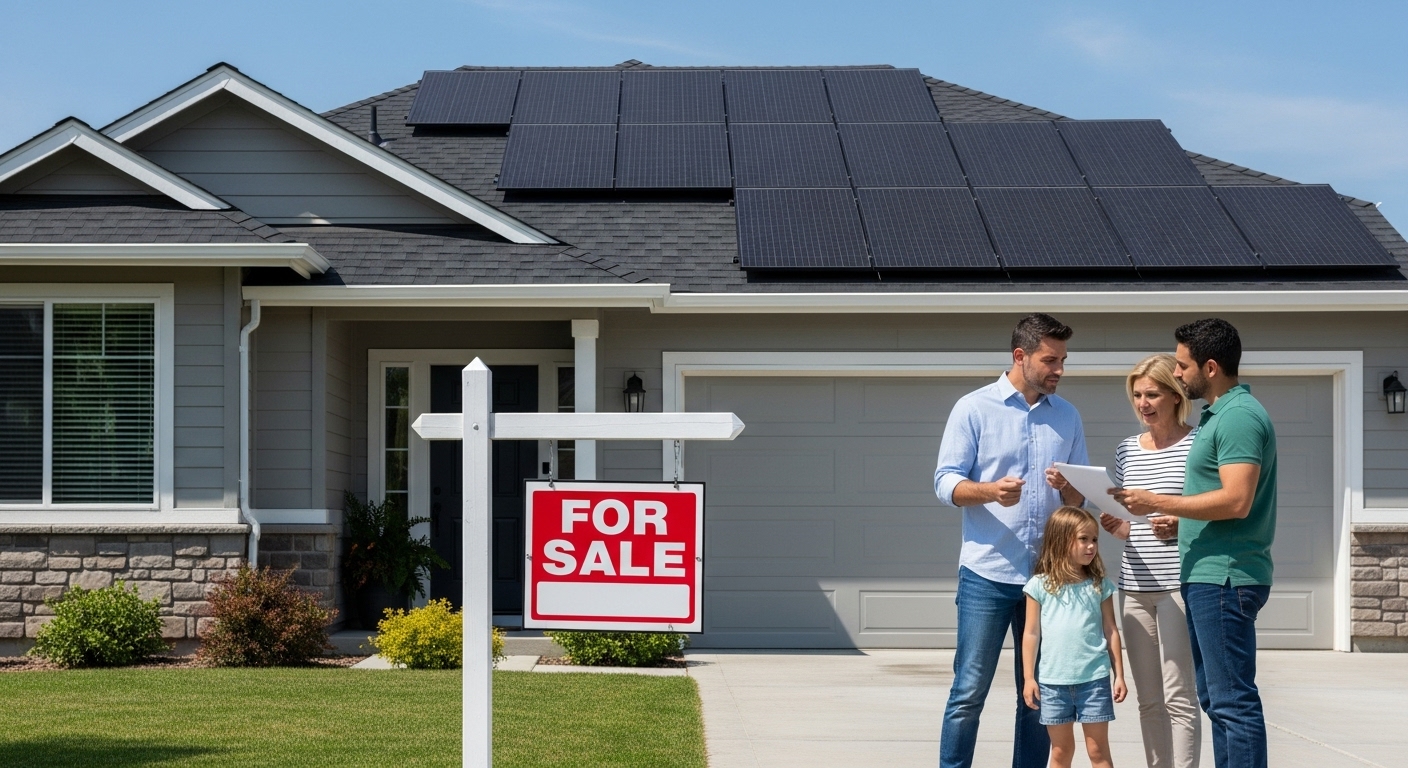Article
Do Solar Panels Make Sense If You Plan to Move?

Do Solar Panels Make Sense If You Plan to Move?
Solar panels can be a rewarding upgrade for your home, as they bring increased value through lower energy costs, enhanced independence, and a higher property value. But, if you decide to move, you’re now faced with the decision to sell the system with your home or take it with you.
Before making a decision, consider the following to ensure you’re protecting your investment and supporting the next phase of your homeownership journey.
Understanding the Impact of Solar Panels on Home Resale Value
Solar panels are an eco-friendly way to gain independence from the grid, reduce your home’s monthly electricity bills, and future-proof your property as the demand for clean energy continues to grow. The exact value solar panels add to your home can vary based on where you live, but homes with solar panels can sell at a higher price than those without.
By this point, you may have seen the 2019 Zillow study citing homes with solar panels sold for about 4.1% more than homes without. However, in 2025, SolarReviews found that homes with solar sold for an average of 6.9% more than those without.
According to the U.S. Solar Market Insight 2023 Year in Review report released by Solar Energy Industries Association® (SEIA), solar accounted for 53% of all new electricity generated in 2022. That was the first time in 80 years that such a monumental energy shift happened in the U.S. In 2024, solar energy accounted for a whopping 66% of all new electricity generated.
But what did this mean for homebuyer trends? Many homebuyers have shown increased interest in homes with solar panels, as they promise to reduce the homebuyer’s monthly electricity bills while also reducing greenhouse gas emissions. Some buyers viewed the eco-friendly aspect as a bonus, while more environmentally conscious homebuyers considered it a priority.
What Are the Financial Benefits of Solar Panels When Moving?
Many homeowners worry about losing their solar investment if they move, but this isn’t entirely true. Solar panels can deliver strong financial returns even after you move, since the same energy-saving benefits you enjoyed will be transferred to the new homebuyer. Having energy savings already built into the home is a huge selling point that can increase the list price. With the increase in homes featuring solar panels, the resale value jumped from approximately 4.1% to 6.9% in just three years. Should the U.S. continue prioritizing the solar industry, this growth is likely to increase over the next few years.
Can Solar Panels Offset Your Moving Costs?
Indirectly, solar panels could provide long-term savings that can help reduce your expenses during or after your move. While your solar panels won’t directly pay for your moving expenses, they can reduce the time your home spends on the market.
To better understand your potential return before listing your home, you should:
- Get an updated home appraisal that includes your solar panel system
- Review your personal energy savings since getting your panels as hard data can be an attractive benefit to homeowners
- Compare local real estate trends to discover what other solar-powered homes sell for
This, of course, applies to homeowners who own their solar panels. If you’re financing or leasing your solar system, discuss this with your solar provider well in advance of listing your home for sale. Having to transfer the title of your system to the new homeowner could increase the time your home’s on the market and your overall ROI.
What Are My Options for Relocating Solar Panels?
You might find yourself asking, “Can’t I just unbolt them from my old roof and bolt them to my new one?” While it is possible to physically take your solar panels with you, it may not be as simple as you think. If you want to take your panels with you, you’ll need to:
- Shut down your system so it’s safe for certified technicians to properly uninstall your panels, racking, and the wiring that powers them
- Ensure your system is properly packed and moved to your new property
- Prepare your new home for solar panel installation
- Have certified technicians properly install your panels
Working with qualified installers like Solar Energy World can also ensure that you have the proper permits and inspections in place before your system goes live at your new home.
It’s important to note that not every solar panel warranty covers systems if they’re moved. Some warranties may cover only specific components of the system, while others cover the system as a whole. In other cases, your warranty may be tied to the original installation address rather than the system itself.
To protect your investment, review your warranty with your solar provider before deciding to uninstall your existing system.
But, what if you have insurance for your solar panels? Most homeowners’ insurance covers rooftop solar panels, but you may need a separate policy for ground-mounted systems. If you’re unsure about this, contact your home insurance provider for more information.
Also, remember to verify whether or not your panels are covered under your mover’s insurance.
Is Relocating Your Solar System Worth It?
Relocating your solar system can be expensive, depending on its complexity. For example, having a system with 15 panels is likely to be more expensive than a system with 30+ panels. You’ll also need to factor in whether your new home is compatible with this system. If the roof or wiring isn’t compatible, you’ll need to rely on the grid until your home is ready for the system.
You’ll also need to reinstall and recommission your new system once your home is compatible.
While the exact figure can vary depending on the provider, some places may charge up to $300 per solar panel removed. Please note that this price doesn’t cover moving fees, inspection fees, or the reinstallation process. From a financial standpoint, it would make more sense to sell your home with the panels still attached.
Can Local Regulations Impact Solar Reinstallation?
From a technical standpoint, once you remove your panels from property A to property B, you’re starting a new project since B never had solar panels in the first place. So, rather than Googling “solar reinstallation policies for (county)”, you should pay attention to the local solar installation policies, as they may have different requirements.
For example, Franklin County, Virginia, has strict environmental and safety standards that solar installers must follow to ensure your solar system is up to code. This can include meeting setback requirements, having stormwater management plans, an acreage limit, and other relevant regulations.
Areas like Fairfax County have more relaxed requirements and straightforward processes that make installation less stressful.
Options for Selling or Transferring Solar Systems
If you have a solar panel system and are deciding whether or not to move, you’ll likely be torn between selling the system with your home or transferring it to your new home. Ultimately, only you can determine which option best suits your needs and budget. Do you have a solar panel system you’re interested in transferring to a new property, or would you like to discuss your options with experts? Contact us today to receive a free solar estimate.
Want a Free Solar Estimate?
Fill out the form to get started today.


